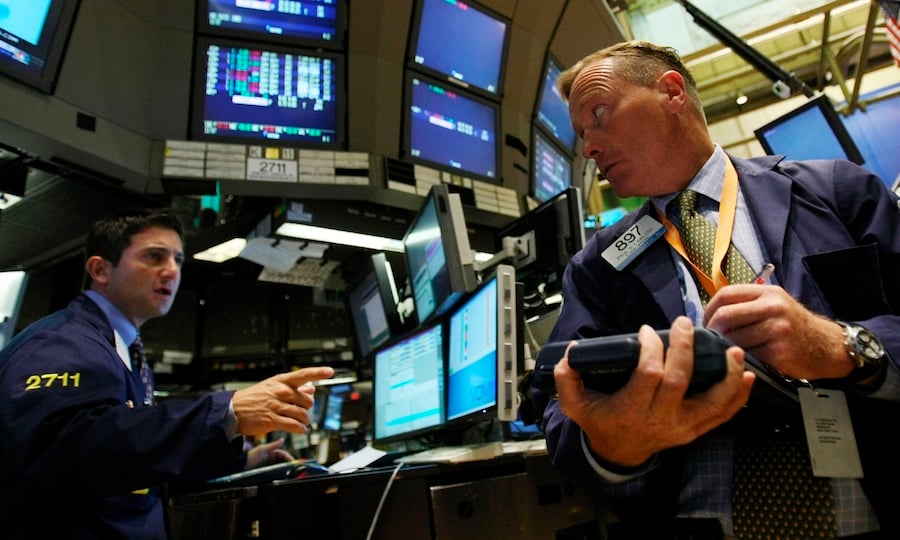Investors shrugged off worries about China and Greece to send the S&P 500 index up 2% last month to its biggest monthly gain since February as most companies reported better-than-expected profits.
U.S. equity investors who delayed July vacations to grapple with the latest chapter in Greece's debt-crisis saga and China's stock collapse were rewarded with the biggest monthly gain since February.
The S&P 500 Index ended July up 2% as Amazon.com Inc. and Google Inc.'s earnings drove the steepest monthly rallies since at least 2010, countering declines by commodity companies. The Stoxx Europe 600 Index climbed 4% as fears eased that Greece will exit from the euro, while a gauge of U.S. volatility signaled little concern about the Shanghai Composite Index's 14% tumble.
“The market got a boost when it became clear Greece wouldn't be as impactful as investors initially anticipated,” Jeff Sica, who oversees more than $1.5 billion as the head of Circle Squared Alternative Investments in Morristown, N.J., said. “There's also an ignorance-is-bliss mindset when it comes to China. Investors are now waiting for new information around earnings or the Fed, and that's likely to be the case for the rest of the summer.”
U.S. trading volume was 7.5% above the five-year July average as investors watched developments in Greece and China and focused on stock picking amid an earnings season that's caused extreme moves in some of the biggest companies. Under the surface of the rally, breadth is deteriorating, a sign of fatigue in a bull market that already rivals anything since World War II in duration.
TECH, CONSUMER
Six of the S&P 500's 10 main industry groups rose during July, with technology and consumer shares up more than 2.2%. Utility companies added 6%, the most out of any group, amid a drop in Treasury yields that made dividend payouts more attractive.
Amazon surged 24% in the month, leading consumer discretionary shares in the S&P 500 to a 4.7% gain. The e-commerce giant posted a surprise second-quarter profit on top of sales that beat analysts' estimates. Chipotle Mexican Grill Inc. and Netflix Inc. increased more than 22%.
Technology companies in the S&P 500 climbed 2.9%, lifted by a 22% rise in Google shares. The Internet search company's stock price took off after profit and sales topped analysts' estimates in the second quarter, and new Chief Financial Officer Ruth Porat signaled plans to bring more restraint to spending.
About two-thirds of S&P 500 companies have reported earnings this season, with 74% beating profit estimates and half of them topping sales projections. Analysts expect a 2.8% drop in second-quarter net income, shallower than calls for a 6.4% fall two weeks ago.
'SETTLING EFFECT'
“The fact that earnings are coming in pretty decently has a settling effect on the market,” Karyn Cavanaugh, a senior market strategist at Voya Investment Management, said. “Things are moving in the right direction and I think the market has digested the fact that we are moving toward a more stable environment.”
Greece's financial markets will reopen on Monday, ending a five-week suspension that began after the country imposed capital controls amid a confrontation with creditors. After winning massive public support for rejecting more belt-tightening in a July 5 referendum, Prime Minister Alexis Tsipras signed up for further cuts as the only way to get an 86 billion euros ($94 billion) rescue loan.
The Chicago Board Options Exchange Volatility Index, which spiked to a five-month high on July 9 at the height of concern about Greece and China's stock rout, ended July down 34%.
The S&P 500's July gain was tempered by Apple Inc.'s 3.3% slide, the biggest drag on the gauge. The world's most valuable company lost almost $40 billion in market value in a single day after quarterly iPhone shipments and the company's revenue forecast missed analyst projections.
Mining and energy stocks paced losses as the Bloomberg Commodity Index retreated 11% in July, the most since September 2011, to trade at a 13-year low. Freeport McMoRan Inc. and Newmont Mining Corp. plummeted more than 26%, while Ensco Plc and Consol Energy Inc. lost more than 24%.
Slowing economic growth in China, which is the world's biggest user of raw materials, is “weakening commodity prices,” said Jason Benowitz, a New York-based senior portfolio manager at Roosevelt Investment Group Inc. Still, “if you look on balance and compare the U.S. to Europe, we think the U.S. looks better,” he said.







